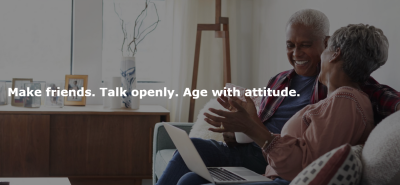Can you believe that Facebook turns 18 this year? One of the troubled teenager’s biggest problems is that not only are the young people still leaving in droves, many of the remaining denizens are 50 or over and susceptible to the various predators and sources of misinformation that plague the site.
 Well, AARP wants to change the landscape of social media for those who are approaching or already living out their twilight years. Basically, they want to lure them away from Facebook. The organization spent untold amounts of money creating Senior Planet Community, which is kind of like a baby version of reddit in that the site is broken into interest categories such as photography, gardening, pets, and fitness enthusiasts.
Well, AARP wants to change the landscape of social media for those who are approaching or already living out their twilight years. Basically, they want to lure them away from Facebook. The organization spent untold amounts of money creating Senior Planet Community, which is kind of like a baby version of reddit in that the site is broken into interest categories such as photography, gardening, pets, and fitness enthusiasts.
The site was developed by Older Adults Technology Service (OATS), who are an AARP affiliate. OATS were leading computer classes for seniors and moved online during the pandemic, and the idea grew from there.
The main difference is that Senior Planet Community is absolutely free (for now, at least), including a complete lack of advertisements. If Grandma’s gonna unwittingly spend hundreds on micro-transactions, it won’t be taking place here, and not just because there’s no mobile app or games just yet. As far as moderation, there’s a long list of house rules that involve courtesy and encourage the citing of sources. Posts can be reported should they violate the rules.
We’ll see how it goes. There are plenty of bad actors that could pretend to be age 50+, or don’t even have to lie about it. We also wonder how long they’ll be able to go without advertisers.
We’re all getting older, including Zuckerberg. Don’t believe it? Here’s video proof.
Main and thumbnail images via Unsplash.
















I left Farcebook 5 years ago.
It’s a disease. People are more concerned with with other people think instead ow what they know. Once they have your info, it lives forever.
Didn’t have things like it in the 70’s so I know I can live without it.
The last 5 years is proof.
I just thought a about sexting on the platform and how I can’t get the image out of my head!
So younger people are not “susceptible to the various predators and sources of misinformation”? I think that’s too simple a stereotype.
Many of the “computer kids” of the first generation are well over 50 today. Time flies, but unfortunately the stereotypes stay.
I am often alarmed by the naivety and lack of IT skills of *younger* people. Posting selfies or playing shooting games doesn’t necessarily make someone an IT pro.
I too am amazed at the naivety and lack of concern for privacy with young people who I’d think would know better. I see that with my own family and others. Young people don’t have a corner on that market though. I know plenty of older folks that are just as ‘unconcerned’. I am not on facebook or twitter, or any of the other ‘social networks’ and never will be. Closest I got was with LinkedIn when I was looking for a job a few years back. When you call them on it, you get a shrug and a response like ‘handy to share pictures and such’ so we use it…. I think the closer you are to working on computers as a network/security/programmer the more you are apt to be concerned and even more paranoid :) … Knowing how things work and how they can be broken and misused almost makes one not to be on the internet.
Misinformation is something everyone has to ‘evaluate’ whether on facebook, the Senior Network, government, or fake-news, or where-ever. Problem is most people don’t feel they have the time to properly research topic and then rely on talking heads to feed them the information. See that all the time with the hot topics of the day. When my son was in Iraq for example, he found what the news wasn’t reporting the reality of what was really happening on the ground, yet that is what ‘we’ the public were spoon fed on.
So many articles offer the glib line “do your research” but fail the most important first step:
How to identify a valid reference among the noise?
I remember the “Good times Virus” in the fall of 1994. There was no virus, but it was a message warning about such a virus. And the message “went viral”. The moment I read it, I could challenge it. Yet people were either reading it or glancing at it, and passing it on. One localalt weekly even a story about it, saying “we haven’t had time to check this, but it sounds serious”.
I never needed special training. I’m not convinced others are dumb, but I’m not sure why they are gullible. Sometimes it seems more like they wish something, rather than understand it.
But people are often lazy. They expect to be taught, rather than learn by themselves. So they look at peripheral things rather than content, to value something.
The first “computer kids” are not the first Internet kids, unfortunately, everything was so different for them and the adoption of computers was also far lower.
On the other hand, the increased usage of computers and Internet means more younger people (who are expected to be more gullible in general) are knowledgable in Internet memes, not in computer science due to the simplification of computers… Even the programming courses don’t make inherently people better at using Internet, even if that’s obvious.
It’s a failure from the start because it assumes older people
are dumb and need to be told what to do
don’t know anything about technology
need to be controlled and restrained – no talk about politics (When politics is one of the most common subjects for older people)
Need an alternative similar to facebook (I use facebook to be available to younger relatives and look at cute cat videos)
Really, they have no hope right from the start if they don’t understand what their primary audience would be attracted to … or in this case insulted and repulsed by.
But older folk are dumb! We know because they consistently vote more conservatively! We need to protect them from themselves.
But more seriously, this will fall flat, because the main thing most old folks like on social media is seeing what their kids and grandkids are up to.
You got it.
Older people don’t choose to join facbook for what it offers. They join because their younger relatives have joined so if you make something “like facebook” for older people then older people wont join because it’s “like facebook”.
The concept is failed before it starts.
It’s more like … we’ll make something like facbook for older people because the older demographic have more money and they’re stupid so it’s easy to get their personal information for marketing.
Said by a older person nearing the top end of the bell curve via VPN and TOR.
Then myspace is about 2 years older?
I remember when Dennis Ritchie died. Suddenly we realized he’d been missing from alt.folklore.computers for months. The originalsocial network, e en if the term was created for facebook.
Great; now the oldster predators have a high-yield venue to focus on (says the 62 year old).
Yeah, smells like fraudster heaven don’t it?
Your sense of smell is spot on. AARP is a political organization. They want money to support lobbying and more ways to reach the generation that always votes.
This is the original chat, based off the Apple //e Divers-Dial software.
https://www.magviz.ca/
No ID crap, just a handle.
I don’t see where this is any different or better than the senior forum I belong to now. It is moderated and has the same rules.
One of the better April 1st articles. Though Jenny’s did make me laugh too.
As far as I can tell the AARP is a really really good marketing company that sells it’s name to almost anybody for almost anything. I have never found them to have anything approaching a deal, not wield their weight for the good of anything. When I think of them I think of them hawking overpriced and sub par products and services..
+1 Also they contribute a lot to one of the political parties.